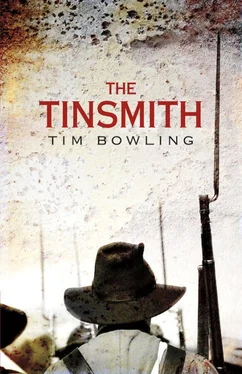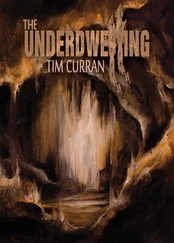“Will you or will you not hold your tongue?”
But Edney did not look away to witness Ambrose Richardson’s temper. She was, instead, entirely absorbed by Miss d’Espereaux’s powers of concentration. The young woman had breathed her way up Louisa’s arm to her shoulder, and now drew back. She folded the cloth and placed it to one side on the bedsheet. Her face was rapt, slightly dewed with effort: the light in her eyes had a candle-flickering quickness. Amazed, Edney stared as the young woman slowly drew the palms of her hands over Louisa’s face, just above the skin. Then, suddenly, she put her hands together and shook them, a look of distaste on her features.
In a voice barely hushed, Collins said, “That’s the bad magnetics she’s shaking out. See. It’s like washing the dirt off your hands, that’s all.”
Miss d’Espereaux’s touch again hovered an inch from Louisa’s brow, then passed all the way down her body to her feet. Again, the young woman clasped her hands and shook them. Then she picked up the cloth once more. This time, she very discreetly spat onto the cloth and placed it over one of the crimson spots at Louisa’s throat.
Mary gasped. Edney noticed out of the corner of her eye that Ambrose Richardson had stepped to the side of her sister-in-law. He bent his white head to hers.
Miss d’Espereaux’s hand passes resumed; it was as if she were covering the child in fine silk. Long moments passed. The room filled with dusk. From outside came the crying of gulls and the lowing of cattle, the life of the ordinary day nearing its end. The creamy colour of Miss d’Espereaux’s throat darkened. Her eyes lost their quickness. When she spat on the cloth again and prepared to lower it, the sound assailed Edney’s ears as if a drunkard had hawked in a gutter. Edney couldn’t move. Something had changed, but she did not possess the strength to stop the young woman’s ministrations. All at once, the room was dark. Mary made soft protesting sounds, almost like whimpers. When Francis Collins began to reassure her, Ambrose Richardson hissed, “Enough!”
Suddenly Miss d’Espereaux stiffened.
“No, no, no!” she cried and put her hands over her face.
In the darkness Edney thought the young woman was striking herself.
“It was well, but there is evil here, a terrible evil.”
“What?” Francis Collins exclaimed. “Liz, what are you saying? That’s not the usual…”
“Damn it, man!” snapped Ambrose Richardson. “Have you no sense?”
“Look here, colonel, I’ve had about all I’m going to take from you. Can’t you tell you’re only wasting your time? Liz, I’m done putting up with this one. Do you hear? I wouldn’t care if he was missing both his arms.”
But Miss d’Espereaux had risen from the bed. Her voice was strange, shrill, her eyes glassy. “Mother! Mother!”
Edney clutched at her stomach. The cry seemed to come from inside her. The dark swirled and then rushed into her eyes. Alone at the foot of her daughter’s bed, she fell.
“Watch it!” a man yelled.
Edney heard herself hit the floor. On her knees, she listened to her heartbeat running fast over the bare planks, louder and louder.
“Mother, oh, Mother,” Miss d’Espereaux whimpered and slumped almost without sound or contact to the floor a few feet away from Edney.
“Lizzie! What is it? For the love of God, girl!”
Edney sensed bodies rushing toward her. A lamp sizzled on, the light burned across the floor and ceiling. Miss d’Espereaux’s horror-stricken face, the beauty shocked out of it, roiled below, as if risen from a current. Then the faces of the men plunged down from above. The footsteps came closer until they reached Edney’s heart. Just as the door burst open, she closed her eyes and let Mary support her weight.
July 1881, Crescent Slough, British Columbia
Anson paid the Indian for his rowing services, then climbed out of the skiff onto the small wharf and looked toward Dare’s operations. His cannery was oddly quiet in the mellow mid-morning sunlight. Only the constant keening of gulls—a sound that at Chilukthan seemed as continuous as the noise of the cannery workings—reminded Anson of the particular slaughter occurring along the river. But there were visual triggers too: a few square-bottomed skiffs pulled up on the dike, some Indian children running silently in the distance, a listing scow on the near bank. Yet, compared with Chilukthan, Crescent Slough seemed almost abandoned. Of course, the fishing hadn’t ended; doubtless many of the skiffs Anson had seen on the river, their occupants hunched over in the sterns, picking fish out of the nets, worked for Dare. His cannery would likely explode into life as the fresh catch came in.
Anson proceeded slowly up the gangway, his eyes trained on Dare’s plain house. There was no sign of life anywhere near it. But then, Dare himself would be either at the cannery or on the river. Anson knew his old comrade-in-arms was every bit as industrious as the Englishman, and Thomas Lansdowne certainly would not have stepped foot inside any house during the past week had his daughter not lain delirious and fevered in her sickbed.
The smoke, therefore, brought Anson up short. It trickled thinly up from behind the house, its white almost transparent against the pale blue of the sky. Anson felt tethered by it, but he resisted the pull. Suddenly he realized that his eagerness to see Dare had been replaced over the past few days with dread. They had not met since shortly after the war, and there was no guarantee there’d be any ease between them. But much more disquieting than that was the old spectre of deceit that always seemed to accompany their relationship. Anson had lied to Thomas Lansdowne about Dare’s blood, he had shaken hands to “prove” that his old friend was white, just as he had once forged papers to prove that a runaway slave named John was a dead and forgotten farm boy and soldier in the Union Army. That had been a simple enough deception: the dead farm boy remained dead to everyone who’d ever known him, and Anson had made certain, initially, that Dare remained out of sight in a tent with some rebel wounded. Later, as it turned out, the deception proved even simpler: the dead soldier had been a recent arrival and had kept to himself. No one seemed to notice his resurrection in the form of a tall white soldier who was, in fact, the mulatto killer of his master.
Anson drew a deep breath of the mud-heavy air. Could it be that, at the bottom of that white finger of smoke, or even nearby in the cannery or on the river, breathed another man for whom the past was such a potent mixture of pride and horror? Somehow it was easier to believe that Dare was dead, that he’d gone into the grave at Antietam with the poor white farm boy at last. Of course, Anson knew he hadn’t, knew he had continued to reinvent himself, always keeping ahead of the deception until the deception itself inevitably increased the pace and caught him from behind, caught them both from behind.
But even as he walked across the yard toward the smoke, Anson knew he was lying to himself, something he had resisted doing for almost all his adult life. It wasn’t punishment or capture that worried him now: what could the world do to him that would change what he’d done in another life and been proud of doing? It was a nagging sense that perhaps, just perhaps, he’d been wrong in his pride. He had sheltered a slave, turned a black man into a white man as if he’d possessed a god’s power. But the Lansdownes’ hatred of Dare had eaten away at Anson’s confidence to the point where he had to concede that his friend, white or black, might have changed for the worse. It was at least possible. And Anson had just lied for him again on no greater basis than an old system of belief.
Читать дальше












